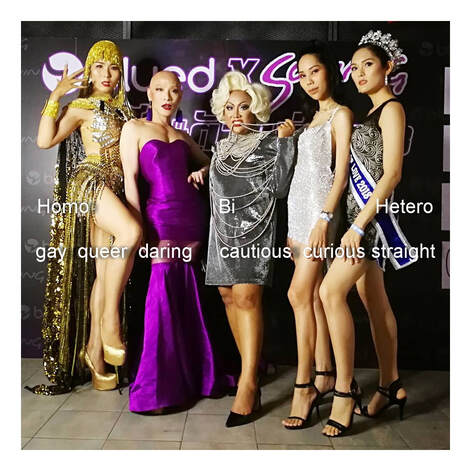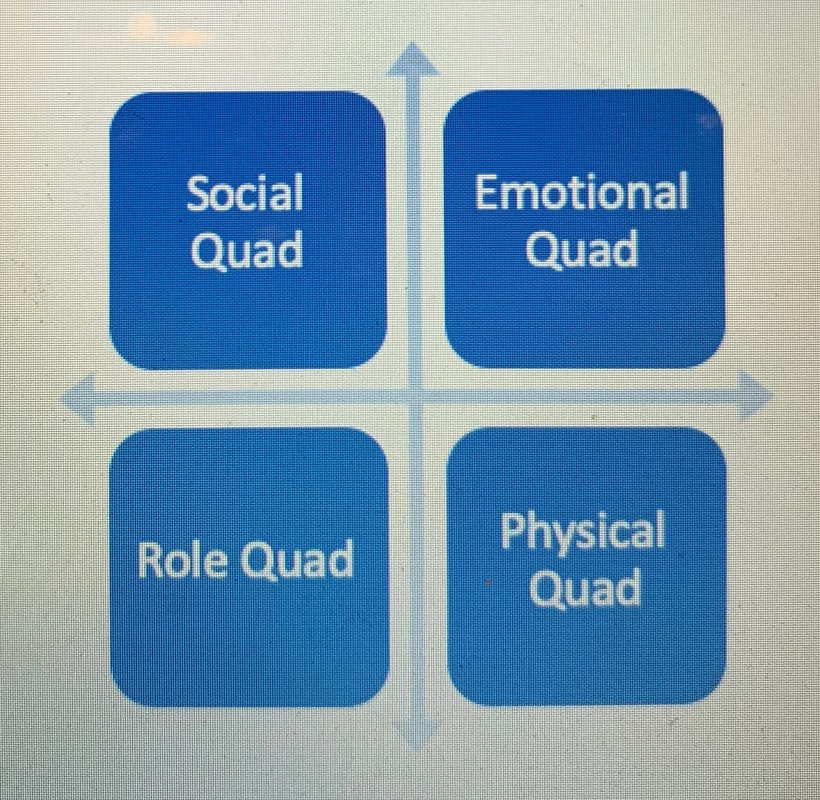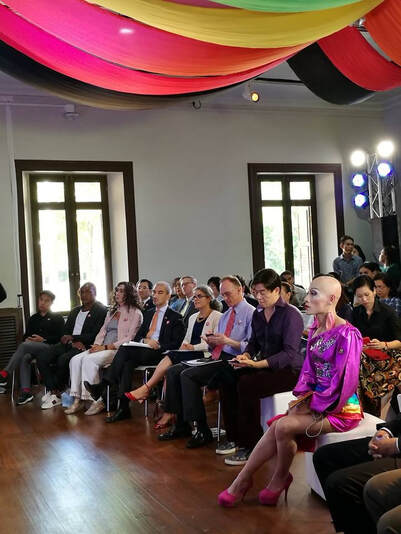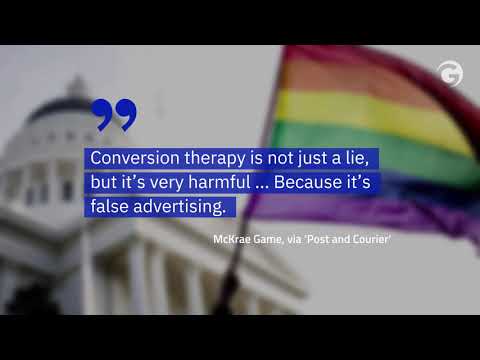|
“People are suffering. People are dying. Entire ecosystems are collapsing. We are in the beginning of a mass extinction. And all you can talk about is money and fairytales of eternal economic growth. How dare you!” -- This was the headline quote on the world’s mass media within minutes after Greta Thurnberg emotionally addressed the United Nations “action summit” on climate change, September 23, 2019.
It has been a remarkable couple of weeks for 16 year-old Greta. After sailing across the Atlantic on a sailboat to avoid carbon emissions (and to make headlines), Greta spent her time going from one TV appearance to another, and then spoke at a US congressional hearing where she boldly presented Congress with copies of a UN scientific report on climate change which she suggested they read, as they should already have done, and then act. On Saturday as many as 4 million people in 150 countries joined the “Global Climate Strike” billed as primarily a young people’s movement, at least to begin with. Greta was the impetus for this worldwide “strike.” Greta addressed the crowd of 250,000 in New York City telling them, “Our house is on fire … it’s time to act.” Greta began her activism a year ago by skipping school on Fridays and sitting outside the Swedish Parliament with a sign “Strike for the Climate”. She was joined by a few other students some Fridays, and then other students in other cities across Europe began to “strike for the climate”. Greta began to get world attention when she was invited to speak at the UN COP24 Climate Summit in Poland in December last year (2018). “Since our leaders are behaving like children, we will have to take the responsibility they should have taken long ago,” Greta told leaders at the summit. “We have to understand what the older generation has dealt to us, what mess they have created that we have to clean up and live with. We have to make our voices heard.” Her speech was remarkable in that she commanded climate change facts combined with strident assertions that it was time for the next generation to arise and act since the older generations were stubbornly refusing to do so. Shortly after that 3 Norwegian Members of Parliament nominated Greta for a Nobel Prize, to be awarded in December. A number of things can be said about Greta Thurnberg, and they have been said by countless commentators. But I wish to highlight a few:
“Greta! Greta! Greta!” the throng of youthful strikers chanted in New York last Friday. A person has made it to the level above front page headlines when they are known around the world by their first name.
0 Comments
THE BINARY IS DEAD BUT DOESN’T KNOW IT YET Every time I make a presentation about gender-inclusiveness in Thailand the question comes again, “But nature is divided into male and female. How can you deny that?” Of course nature is not divided strictly into male and female, but that’s usually not a satisfying reply. What we need to talk about is, “In what respects is gender and sexuality ‘both-and’ or ‘neither one nor the other’?” Rather than defining the terms exclusively with words, I would like to present charts and illustrations, as I did in recent presentations at the university. FIRST, SEXUALITY IS ABOUT PHYSICAL FACTORS The factors include: chromosomes, hormones, genitalia, and secondary sex characteristics. In a significant number of individuals these physical factors are misleading, and in others the factors are ambiguous. Most physical factors, of course, are clear and indicative of a birth sex, either male or female, and they become more pronounced when individuals reach sexual maturity. SECOND, GENDER IS ABOUT MENTAL AND EMOTIONAL FACTORS The factors include: fantasies, fascinations, self-understanding, preference for sex and romance. It is commonly misunderstood that these mental and emotional factors are or can be controlled in accordance with social or religious requirements. Notice, please, that none of these factors are describing actions in response to the factors. Depending on circumstances, one can and often must refrain from certain actions. On the other hand, as psychologists know, sometimes when inconsistency between emotional conditions and social-physical action is resolved, obsessions disappear. On the whole emotional health is enhanced by correctly discerning “what is” and being at peace with that reality. The spectrum is a continuum between Homosexual and Heterosexual. Increments along the continuum include, at the one pole, GAY (exclusively same-sex oriented for sex and romance), QUEER (very clearly same-sex oriented or definitely different in that regard), DARING (willing to explore options in search of excitement and satisfaction), CAUTIOUS (willing to deviate from narrow confines under very limited conditions of safety or anonymity), CURIOUS (open to the ideas that alternatives suggest while regarding those as uncommon), and STRAIGHT (exclusively oriented toward sex and romance with persons of the “opposite” sex). THIRD, SOCIAL RESISTANCE IMPACTS ONES CHOICES The spectrum extends from persecution to affirmation In some societies it is a capital crime to be gay or to act contrary to the sexual mores assigned by society. At the other side of the spectrum are societies that value the unique perspectives and contributions of LGBTQIK members of society. How we present ourselves depends to some extent on the freedom societies give us to express ourselves as we discern ourselves to be. Dangerous, oppressive societies often foster denial to such an extent that individuals dare not admit, even to themselves, their diversity. The spectrum goes from PERSECUTION to PENALTIES to TOLERANCE to ACCEPTANCE to INCLUSION to AFFIRMATION We who are LBBTK in Thailand experience these forms of social reaction as: PERSECUTION is sustained efforts to eliminate us through various sorts of suppression. This is rare and counter-cultural in Thailand, although some religious and ethnic sub-cultures exercise control that could swell into persecution. PENALTIES for being LGBT are imposed in the name of cultural normality. The most frequent are job ceilings in certain professions, or punishment for refusal to fulfill family obligations (such as producing heirs). TOLERANCE of sexual and gender diverse individuals is widespread. It is experienced as “being put up with” while those who put up with us are not pleased to do so. ACCEPTANCE is a milder form of tolerance, meaning in most cases that there has been compromise to achieve the absence of rancor and discord. INCLUSION involves the absence of all barriers to full participation in the social group. AFFIRMATION is active recognition of our unique perspectives and relationships. It is rare in this and most other societies at present. FOURTH, SOCIAL IDENTITY Social identity, how people are identified by society, is the conclusion that the majority of casual observers will draw based on two factors: the personal presentation choices the individual has made, and social sensitivity to their conclusions about what they see. Presentation choices are of two types: Sex markers (physical): facial features, breast and crotch, voice quality. Gender markers (behavioral): clothing and accessories, vocabulary, movements / posture / gestures. The stronger the social resistance to gender nonconformity, the fewer the markers that will arouse hostile reaction. The more permissive the society, the more radical the markers must be to evoke a reaction. The goal in establishing one’s gender identity in society is: Either to pass unnoticed in society OR to elicit responses FIFTH, SATISFACTION A person’s satisfaction with their gender and status in society depends on how much effort (of all kinds) it takes to achieve satisfaction, and how much satisfaction is achieved. There are four quadrants on the satisfaction grid. The SOCIAL QUAD includes family, friends, and community primarily, but also the wider society where interactions take place. The EMOTIONAL QUAD includes one’s internal turmoil or serenity, how one’s needs for appreciation are being met, and general happiness versus stress. One’s gender status is only one set of factors that impact emotion, of course. The ROLE QUAD includes one’s labor, contributions to society, provision for those for whom one is responsible, and measurable accomplishments. If one’s gender has a negative effect on one’s role it takes more effort to achieve role satisfaction. The PHYSICAL QUAD includes health and physique, as well as ability to function sexually. In some cultures physical development is a valued accomplishment or even a requirement for a satisfactory status and relationships. Health and freedom from disease and accidents aside, physical satisfaction comes from the ability to do what one wants to do. Therefore, it varies with age and circumstances as well as with such emotional factors as urges and goals. What I have tried to illustrate is how nothing with regard to one’s gender, sexuality, and functioning in society are fixed or cut and dried. We are all somewhere along a number of spectrums.
[Thanks to Sirisak for providing a constant stream of advocacy for better understanding of gender diversity and ambiguity. Sirisak is the most photographed and recognizable LGBTIQK advocate in Thailand. Thanks also for the pictures above that Sirisak starred in.] Essay #4 on SOCIAL ORDER
Expression vs. communication “OMG this is awful” she exclaimed in bright red letters on Facebook. That was it, no explanation of the exclamation. No clue about what was awful. Within an hour 20 friends were sympathizing mindlessly and wanting to know more. For a day she refused to reply. I began to wonder whether she was just getting a kick out of messing with us, but I think something was messing with her. Compassion aside, what she was doing was not communication, although it is what passes for it these days of communication deterioration. Internet Communication Technology (ICT) has changed the parameters of speech. Before: Expression was contained: private, personal, privileged Communication was conversational, conventional, conciliatory Media were moderated, managed, modulated Now: Everybody is the owner of their media The right to express is being aggressively asserted (under the banner of “free speech”) The effects of expression on communities (e.g. hate speech) are denied The difference between expression and communication is blurred How did we get into this loss of meaningful communication? Not surprisingly modern philosophers have dedicated a lot of their speculation toward the subject of communication. The move to consider language as the basic philosophical issue began with Bertrand Russell, of England. Bertie insisted, “a statement that purports to be about reality but whose truth or falsehood makes no observable difference to anything has no content, no meaning – it is not saying anything.” Only statements that are empirically verifiable are empirically meaningful; and the actual meaning of any given statement is revealed by the mode of its verification. The tool to sort this out is logic, a field in which Russell had excelled. For example, using logic, we can sort out the truth or falsehood of the following statements, and if we cannot, then the statements are meaningless.
All the statements are in some sense false, but the reasons are different. The English throne is wooden, not iron (if by that is meant the “Coronation Chair with the Stone of Scone”). It is factually erroneous. There is no such thing as an American throne because the USA does not have any form of monarchy, so the statement is ridiculous. The Pope has a number of thrones, and any chair upon which he is seated is a throne if the Pope is performing official duties, but none of them are principally made of iron and, more importantly, the term “Papal throne” refers not to a chair but to the office. The throne in Kings Landing in George R.R. Martin’s books Game of Thrones, does not exist in reality and everything about the Iron Throne refers to a fictional object in a fantasy realm. However, within the realm of literature, the phrase would be true until the last episode when the throne was destroyed by dragon fire. The English throne can be metaphorically said to be made of iron, being durable as England is enduring. When an entity being discussed does not really in any sense exist, any statement about it is meaningless. This distinction was picked up by Ludwig Wittgenstein, Bertrand Russell’s student and successor as the major philosopher of England, having moved there from Austria when the Nazis took over Austria. Wittgenstein was renowned as the founder of the philosophical school of Logical Positivism, a rigorous type of analytical philosophy. What the Logical Positivists sought to analyze was not the logic that Russell thought to be the key to what can be said to be true or false, but the content of the words being used. Wittgenstein insisted that words have only the content assigned to them. Words mean what the users intend for them to mean. Moreover, words derive their meanings ultimately from whole forms of life. For example there is a whole world of scientific activity and scientific terms derive their meaning from the way they are used within the scientific world. There are whole worlds of military, political, religious, musical and countless other activities within which a term may have a specific meaning it does not have in another context. For example. “head” in the world of fresh produce draws to mind something like a cabbage. “I’ll take that head,” she said to the green grocer. The head of a social structure would be the appointed leader. “The chairman is the head of this company.” In the world of physical anatomy the head means a complex part of the body. “Use your head,” his mother shouted. Whereas, for a sailor, the “head” most commonly means the toilet. Logical Positivists rejected the idea that anything can be meant by a term unless its context is known, which provides the most important clue to what the term means to the person using it. Michel Foucault followed Wittgenstein and went a step further to propose that the reason people use terms, whatever their world of discourse, is that the user wants to manipulate or control the recipient. In fact all narratives do this, but mega-narratives do it in a mega-way, by which those with social power seek, through the invention of stories and myths, to extend their influence and control. Foucault advocated the deconstruction of those cultural artifacts, and insisted that the smaller the narrative the less it needed to be mistrusted. Foucault’s discursive analysis theories have the potential to revise the major political structures of the Enlightenment. At the same time the post-structuralist movement, until recently called post-modernism, has become the prevailing tone of voice of our times. Installing doubt about the intentions of all speakers -- without a positive counter-force -- has led to cynicism and a “me-mindset.” Doubt has morphed into suspicion and fear. The fragmentation of empires has led to the break-down of nations, the establishment of enclaves, and the embellishment of protectionism by ever-smaller socio-cultural units. Enter the era of EXPRESSION rather than conversation. If all words are contextual and infected with manipulative intention, the words do not contain anything that matters. What is left are effusion, expostulation, and effect. That is now amplified by the development of technological ways of storing data and disseminating it. The local newspaper gave way to television which then relinquished its main purpose of broadcasting information in favor of entertainment. Even the “news” must be entertaining. Newsmakers must be valuable as attention-grabbers. Boring politicians is an oxymoron, or will be at the next election. Absurd and ludicrous are preferable to bland and rational. ICT has made possible hundreds of “channels” of TV, and every individual with a smart phone can be a producer. In the domain of private discourse, too, meaning is not validated by content having a specific, consistent reference. Children learn this as an early survival strategy. Crying from hour one is just expression. By about day one it becomes more often expression of felt need. By year one the clever child has developed diverse ways to communicate felt needs. By year ten, mother, too, has acquired (or remembered from ancestors) skills in which “it’s not what she says but what she means.” “I’ve made your favorite dessert,” she says; but she means, “Congratulations on making it through that difficult patch, or passing that landmark.” Threats, as well, rarely mean what they say. So we grow up and move on to become part of the social order. We belong to different groups, and we mean different things in each one. It can be confusing. It tends to be challenging. It can, at times, be exhilarating to be Grandpa in one context, pastor in another, community elder just outside the gates, and author of essays. As we grow toward senility, or at least some form of advanced aging, we have more stories to tell, but they mean less and less. Once, our story might have suggested a course of action. Then later, that same story could have been a cautionary tale. Now it is a nostalgic recitation. But for every listener in this time in which we live, the task is to sort out what is true from what is meaningful. That is how our social order is kept from destroying itself and from deteriorating into irrelevance. VANISHING VILLAGE CULTURE
Rice planting has been a back-breaking labor for millennia, but the harvests have fed billions of people. In every aspect of planting and harvesting irrigated rice there has been progress away from muscle-power by animals and human beings to mechanical power by machines. Here in our valley the last bit of rice production still largely undertaken by men and women is planting and transplanting the rice. This year, for the first time, I believe, one of the farmers in our village hired mechanical transplanting machines to do the job. I got pictures that evening when the machines were transplanting seedlings. It took them about half an hour to do one patch with a team of 2 supplying the labor. That compares to a neighbor who hired a team of 8 workers to do the same job in about an hour and a half in the next field the next morning. Today, exactly two weeks later, I took pictures of the side-by-side fields. The results do not look promising for the new mechanical innovation. Farmers tell me, no matter how the ripe rice fields look (I may get pictures of that in about 100 days), it’s clear that the loss of productivity will more than eat up the savings on the cost of transplanting. No matter how this initial foray into mechanized transplanting turns out, rice will have to be produced in new ways. The old rice culture is unsustainable. Reasons for that are piling up. For one thing, the new generation of young village men and women are unwilling to work the family farms. They want jobs with dependable salaries, which also come with easier working conditions. In the second place, the price of rice barely equals the cost of growing it, and that is without figuring in the value of the farmer’s own labor that does not have to be hired. This week the staple for Northern Thailand, sticky rice, was selling for 15 baht a kilo, and it would be cheaper to buy rice at that price than to grow it. The clincher is that as more and more farmers transform their rice fields into orchards or plant better cash crops, the thousand year old irrigation infrastructure is breaking down. The government has pronounced its development policy in behalf of high-tech industry. That’s two steps removed from agriculture, with high-tech industry slowly replacing heavy industry as the developmental goal. No matter whether the government’s policy is an unattainable pipe-dream or not, HM the late King’s lifelong interest in promoting agriculture through diversified crops and agricultural research institutes as well as better land utilization, is now officially replaced. We’ve just had another week of rancorous arguments about conversion therapy. In brief, conversion therapy is a term invented to describe a wide variety of techniques to help people get over being gay. Some of the techniques are exclusively religious using such things as prayer and meditation, but other techniques are borrowed from psychiatric treatments (many of them long since discontinued by psychiatric medicine). The word therapy is meant to cast an aura of scientific validity. But medical and psychiatric associations have denounced conversion therapy as both ineffective and destructive. So far 18 states in the USA have passed laws declaring conversion therapy illegal, as have a handful of other countries.
Still, conversion therapy is clung to tenaciously by those who feel a need for hope. It was the “Hope for Wholeness Network” that made headlines last week when its founder, McKrae Game made his last and most definite denunciation of the therapy and announced that he was also gay, meaning that not even the founder of the largest Christian network had found “freedom from homosexuality through Jesus Christ” (which is the slogan of the Hope for Wholeness Network). “I was a religious zealot that hurt people. People said they attempted suicide over me and the things I said to them.” Among those things were that they were going to eternal Hell. It is uncertain, of course, how many people actually succeeded in committing suicide because of the shame heaped upon them by Game and the Network. Last week he wrote on Facebook, “The very harmful cycle of self shame and condemnation has to stop.” McKrae Game joins a lengthening list of conversion therapy enthusiasts who have declared the therapy is a fraud (misadvertizing, Game called it). In 2013 Alan Chambers, the former president of Exodus International shut down the organization. At the time, Exodus International was the largest alliance of organizations advocating the possibility of changing one’s gender orientation. Meanwhile, also last week the results of a massive study were published about the search for a “gay gene”. It concluded that there is no one gene that determines a person’s sexual orientation, but genetics – along with environment, play a part in shaping sexuality. The August 29 issue of the Washington Post reported that Andrea Ganna, lead author and European Molecular Biology Laboratory group leader at the Institute of Molecular Medicine in Finland said that the research reinforces the understanding that same-sex sexual behavior is simply “a natural part of our diversity as a species.” The study was published Thursday in the journal Science. It was based on interviews with 470,000 people in the UK and USA. In total, 5 genetic patterns account for not more than 32% of the factors while environment and other circumstances must account for the rest. Not only is there no gene that causes us to be gay, there is no way to find out who is genetically gay by looking at all the genes. Being gay is simply too complicated. Even though we knew that, LGBTQ critics of the study feared that the mere fact there was a lack of convincing evidence that being gay was completely genetic would give fuel to conversion therapy advocates. Sure enough, the ink wasn’t dry on the newspaper reports before claims began to appear that “now we have science on our side that environment is what causes people to think they are gay.” If environmental factors are the main ones in people being gay, then changed environment that eliminates and counters those influences should bring about change, conservatives in government and evangelicals in Christianity were swift to explain. The question that sustains conversion therapy advocates is, “Does it EVER work?” The answer is that there are people who swear they have been cured. There is no convincing response to such testimonies. Not even the fact that leading personalities like Martin Duberman (1991), Alan Chambers and McKrae Game have renounced conversion therapy will wipe out the conviction that it can work and has worked for some people. The question that motivates conversion therapy opponents is, “Is it harmful?” Isn’t it just like certain diet fads which one may try and see for themselves? At the extreme, are conversion camps where under-age children are sent and subjected to horrible punishment. One of those cases came to light in the media a week ago, too. Documentary movies and books have exposed those extremes. But even verbal abuse can be damaging, and physical restraints are not the most common form of imprisonment. Family and social prisons are very real. As Game said, suicides have been attempted because of the religious bullying and intimidation. Medical societies have denounced conversion therapy not only because it is based on spurious science (and just doesn’t work) but because it damages vulnerable patients who despair that they are failing to be cured. That is the danger. When you promise someone that they will get results they desperately want, but then they fail to get those results and it is because of their own inadequacy and weakness, you set them up to try something desperate. As a growing number of states and countries now see it, providing conversion therapy to minors is not a matter of religious freedom, it is a criminal offence. |
AuthorRev. Dr. Kenneth Dobson posts his weekly reflections on this blog. Archives
March 2024
Categories |
| Ken Dobson's Queer Ruminations from Thailand |
|











 RSS Feed
RSS Feed
